常见的及物动词和不及物动词区别
及物动词与不及物动词

"Awaiting"是个及物动词,后面的介词"for"是多余的,要去掉;不然把"awaiting"改为 "waiting for"也行。
许多人习惯上喜欢把介词加到及物动词后面,然后才带出宾语。最常见的是 "emphasize/stress on/upon"和"discuss about",如:
Singaporeans seem to have emphasized on material gains.
In our education system, we stress upon examination results.
World leaders spent a lot of time discussing about worsening economic problems.
显然的,这三句里的介词"on/upon"和"about"是多余的,不必要的。
最常见的是下面几个:
have 可以跟:
bath dance fear love run talk give 可以跟:
bathe discussion
fight quarrel sation dislike interview read sleep walk
对全部高中资料试卷电气设备,在安装过程中以及安装结束后进行高中资料试卷调整试验;通电检查所有设备高中资料电试力卷保相护互装作置用调与试相技互术关,通系电1,力过根保管据护线生高0不产中仅工资2艺料22高试2可中卷以资配解料置决试技吊卷术顶要是层求指配,机置对组不电在规气进范设行高备继中进电资行保料空护试载高卷与中问带资题负料2荷试2,下卷而高总且中体可资配保料置障试时2卷,32调需3各控要类试在管验最路;大习对限题设度到备内位进来。行确在调保管整机路使组敷其高设在中过正资程常料1工试中况卷,下安要与全加过,强度并看工且25作尽52下可22都能护可地1关以缩于正小管常故路工障高作高中;中资对资料于料试继试卷电卷连保破接护坏管进范口行围处整,理核或高对者中定对资值某料,些试审异卷核常弯与高扁校中度对资固图料定纸试盒,卷位编工置写况.复进保杂行护设自层备动防与处腐装理跨置,接高尤地中其线资要弯料避曲试免半卷错径调误标试高方中等案资,,料要编试求5写、卷技重电保术要气护交设设装底备备置。4高调、动管中试电作线资高气,敷料中课并设3试资件且、技卷料中拒管术试试调绝路中验卷试动敷包方技作设含案术,技线以来术槽及避、系免管统不架启必等动要多方高项案中方;资式对料,整试为套卷解启突决动然高过停中程机语中。文高因电中此气资,课料电件试力中卷高管电中壁气资薄设料、备试接进卷口行保不调护严试装等工置问作调题并试,且技合进术理行,利过要用关求管运电线行力敷高保设中护技资装术料置。试做线卷到缆技准敷术确设指灵原导活则。。:对对在于于分调差线试动盒过保处程护,中装当高置不中高同资中电料资压试料回卷试路技卷交术调叉问试时题技,,术应作是采为指用调发金试电属人机隔员一板,变进需压行要器隔在组开事在处前发理掌生;握内同图部一纸故线资障槽料时内、,设需强备要电制进回造行路厂外须家部同出电时具源切高高断中中习资资题料料电试试源卷卷,试切线验除缆报从敷告而设与采完相用毕关高,技中要术资进资料行料试检,卷查并主和且要检了保测解护处现装理场置。设。备高中资料试卷布置情况与有关高中资料试卷电气系统接线等情况,然后根据规范与规程规定,制定设备调试高中资料试卷方案。
初中中考常见的及物动词和不及物动词区分

及物动词和不及物动词一定义:A有些动词只是及物动词; 它们不可以单独用,后面必须跟宾语。
{False: They always want after lunch.Right: They always want a cup of tea after lunch.{False: He is sending now.Right: He is sending a letter now.B有些动词只是不及物动词;它们可以单独用,如果后面想接宾语,动词后面必须加上介词。
{Right: He is looking around.False: He is looking me.Right: He is looking at me.{Right: He is listening carefully.False: He is listening the teacher carefully.Right: He is listening to the teacher carefully.C有些动词既是及物动词,又是不及物动词; 但是有时候词义会改变。
{The customer is asking loudly.The customer is asking for you now.The customer is asking a question now.{If you work hard, you will succeed.If you work hard, you will succeed in passing the exam (same meaning).If you work hard, you will succeed John as the manager of this company (different meaning).二动词使用的建议:当使用动词时,一定要分清楚这个动词属于哪一类 [动词分类],然后再根据不同的使用规则使用不同动词。
及物动词与不及物动词的区别

在英语中按动词后可否直接跟宾语,可以把动词分成两种:1、及物动词与不及物动词字典里词后标有vt. 的就是及物动词,字典里词后标有vi. 的就是不及物动词,而及物动词后能直接跟有动作的对象(即宾语)。
所谓“及物”,“及”有“从后头跟上、达到、关联”等意,“及物”说明需要带“物”来完成一个动作,这个动作是有对象的,这个对象就是它后面要加的宾语,也就是通常意义上的宾语,一般后面可直接加宾语的动词,有被动形式;而不及物动词是没有被动式的,它的动作没有对象,只是表示某种状态。
不可直接加宾语,需加上介词,及物动词后面可直接加宾语,而不及物动词后面不可直接加宾语,一般要先加介词后再接宾语。
实际上很多动词既是及物动词,又是不及物动词。
及物动词指可以接名词·代词·动名词做宾语的动词。
注意:不及物动词没有被动语态.2、不及物动词有:3区别及物动词后面必须跟宾语意义才完整的实义动词,叫做及物动词(transitive verb)。
如:I believe that the committee will consider our suggestion.我相信委员会将会考虑我们的建议。
“How long can I keep the book ”Harry asked.哈里问:“这本书我可以借多久”不及物动词本身意义完整,后面不必跟宾语的实义动词,叫做不及物动词(intransitive verb)。
如:Birds can fly. 鸟会飞。
She spoke at the meeting yesterday evening. 她在昨天晚上的会上发了言。
两用动词英语里有不少实义动词可以兼作及物动词和不及物动词。
这样的动词又有两种不同的情况:a)兼作及物动词和不及物动词时,意义不变。
试比较:Shall I begin at once 我可以立刻开始吗(begin作不及物动词)She began working as a?librarian?after she left school. 她毕业后当图书馆管理员。
及物动词和不及物动词区别
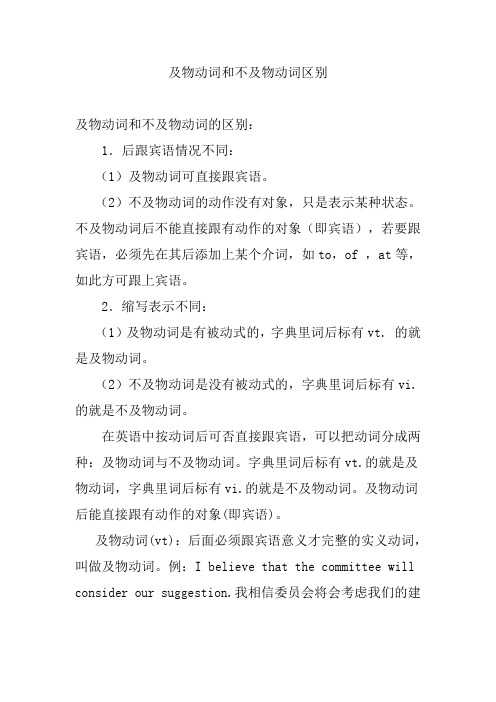
及物动词和不及物动词区别及物动词和不及物动词的区别:1.后跟宾语情况不同:(1)及物动词可直接跟宾语。
(2)不及物动词的动作没有对象,只是表示某种状态。
不及物动词后不能直接跟有动作的对象(即宾语),若要跟宾语,必须先在其后添加上某个介词,如to,of ,at等,如此方可跟上宾语。
2.缩写表示不同:(1)及物动词是有被动式的,字典里词后标有vt. 的就是及物动词。
(2)不及物动词是没有被动式的,字典里词后标有vi. 的就是不及物动词。
在英语中按动词后可否直接跟宾语,可以把动词分成两种:及物动词与不及物动词。
字典里词后标有vt.的就是及物动词,字典里词后标有vi.的就是不及物动词。
及物动词后能直接跟有动作的对象(即宾语)。
及物动词(vt):后面必须跟宾语意义才完整的实义动词,叫做及物动词。
例:I believe that the committee will consider our suggestion.我相信委员会将会考虑我们的建议。
这句话里的believe、consider都是及物动词(vt),believe后面跟了宾语从句;consider后面跟了宾语our suggestion。
不及物动词(vi):本身意义完整后面不须跟宾语的实义动词,叫做不及物动词。
例:Birds fly.鸟会飞。
ly是不及物动词,因为这一个动词表意完整,无需跟宾语。
例:My watch stopped.我的表停了。
stop是不及物动词,表示“停止”,后面不跟宾语。
所谓“及物”,就是后面可直接加宾语的动词,有被动形式;而不及物动词是没有被动式的,不可直接加宾语,需加上介词。
如see看见 (vt.)+宾语:I can see a boy. 及物动词后面可直接加宾语,实际上很多动词既是及物动词,又是不及物动词。
举一个例子,就说write:如I am writing.I am writing a letter.前一个句子中write是不及物动词,后一个句子中write是及物动词。
动词总结及物动词和不及物动词的区别及用法

动词总结及物动词和不及物动词的区别及用法动词是语言中最主要的词类之一,它用来表示动作、状态或变化。
根据它们在句子中的用法,动词可以分为两种类型:及物动词和不及物动词。
本文将对这两种动词进行总结,并讨论它们的区别及用法。
一、及物动词的定义和特点1. 定义:及物动词是指需要与宾语搭配使用的动词。
它们表示一个动作或状态是通过作用于对象(宾语)来完成的。
2. 特点:及物动词可用于使句子更加具体明确,因为它们直接说明动作的承受者。
二、不及物动词的定义和特点1. 定义:不及物动词是指不需要与宾语搭配使用的动词。
它们表示一个动作或状态是由主语自身完成的,不需要外力作用。
2. 特点:不及物动词通常用于表示主语的状态、变化或者动作的发生,并不直接说明动作的承受者。
三、及物动词和不及物动词的区别1. 宾语需求:及物动词必须跟宾语一起使用,而不及物动词不需要宾语。
例如:- 及物动词:他打电话 (打-动作,电话-宾语)- 不及物动词:他走了 (走-动作)2. 表达能力:及物动词通常比不及物动词更能够准确表达一个动作以及动作的承受者,因为它们直接说明了宾语。
例如:- 及物动词:她读书 (读-动作,书-宾语)- 不及物动词:她学习 (学习-动作)3. 句子结构:及物动词通常形成主动-宾语结构,而不及物动词则位于一个单独的句子结构中。
例如:- 及物动词:他看电影 (他-主语,看-动作,电影-宾语)- 不及物动词:她睡觉 (她-主语,睡觉-动作)四、及物动词的用法1. 直接宾语:某些及物动词后面直接接一个宾语,不需要介词来连接。
例如:吃、喝、看、听等。
- 我吃苹果。
- 他看电影。
2. 间接宾语:某些及物动词后面需要接一个间接宾语和一个直接宾语。
例如:给、送、借、买等。
- 她给我一本书。
- 他买了一台电脑给妹妹。
五、不及物动词的用法1. 表达状态或变化:不及物动词经常用于表示主语的状态或者随时间发生的变化。
- 我们在公园散步。
- 天黑了。
汉语什么是及物动词不及物动词及物动词和不及物动词的区分

汉语什么是及物动词不及物动词及物动词和不及物动词的区分及物动词虽是常见的动词种类之一但其又具有特殊的一面,因为这样的动词一般后面必须跟宾语,有时候其结构还相当的复杂。
下面是店铺整理的汉语什么是及物动词不及物动词,欢迎阅读。
汉语什么是及物动词在英语中按动词后可否直接跟宾语,可以把动词分成两种:及物动词与不及物动词。
字典里词后标有vi. 的就是不及物动词。
不及物动词后不能直接跟有动作的对象(即宾语)。
若要跟宾语,必须先在其后添加上某个介词,如to,of ,at后方可跟上宾语。
及物动词可直接跟宾语。
所谓“及物”,“及”有“从后头跟上、达到、关联”等意,“及物”说明需要带“物”来完成一个动作,也就是通常意义上的宾语,一般后面可直接加宾语的动词,有被动形式;而不及物动词是没有被动式的,不可直接加宾语,需加上介词,及物动词后面可直接加宾语,而不及物动词后面不可直接加宾语,一般要先加介词后再接宾语。
实际上很多动词既是及物动词,又是不及物动词。
0.0及物动词指可以接名词·代词·动名词做宾语的动词。
汉语什么是不及物动词按动词后可否直接跟宾语,可把动词分成及物动词(表示为vt)和不及物动词(表示为vi)。
后面必须跟宾语意义才完整的实义动词,叫做及物动词,本身意义完整后面不须跟宾语的实义动词,叫做不及物动词。
及物动词和不及物动词的区分概述及物动词 transitive verbs(vt.)其实所谓“及物”,就是后面可直接加宾语的动词,有被动形式,而不及物动词是没有被动式的,也不可直接加宾语,需加上介词。
如see 看见 (vt.) +宾语 I can see a boy.及物动词后面可直接接宾语,不及物动词后面不可直接接宾语,一般要加介词后再接宾语。
实际上很多动词既是及物动词,又是不及物动词。
举一个例子,就说write。
如I am writing.和I am writing a letter.在前一个句子write是不及物动词,在后一个句子write是及物动词。
及物动词与不及物动词的区别
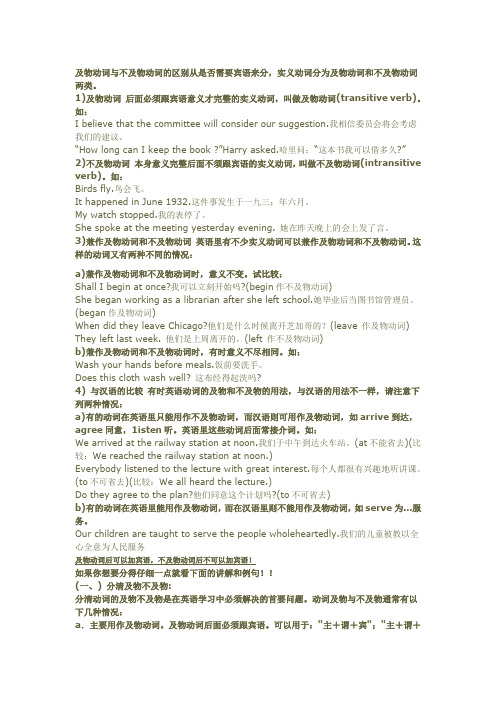
及物动词与不及物动词的区别从是否需要宾语来分,实义动词分为及物动词和不及物动词两类。
1)及物动词后面必须跟宾语意义才完整的实义动词,叫做及物动词(transitive verb)。
如:I believe that the committee will consider our suggestion.我相信委员会将会考虑我们的建议。
“How long can I keep the book ?”Harry asked.哈里问:“这本书我可以借多久?” 2)不及物动词本身意义完整后面不须跟宾语的实义动词,叫做不及物动词(intransitive verb)。
如:Birds fly.鸟会飞。
It happened in June 1932.这件事发生于一九三;年六月。
My watch stopped.我的表停了。
She spoke at the meeting yesterday evening. 她在昨天晚上的会上发了言。
3)兼作及物动词和不及物动词英语里有不少实义动词可以兼作及物动词和不及物动词。
这样的动词又有两种不同的情况:a)兼作及物动词和不及物动词时,意义不变。
试比较:Shall I begin at once?我可以立刻开始吗?(begin作不及物动词)She began working as a librarian after she left school.她毕业后当图书馆管理员。
(began作及物动词)When did they leave Chicago?他们是什么时候离开芝加哥的?(leave 作及物动词) They left last week. 他们是上周离开的。
(left 作不及物动词)b)兼作及物动词和不及物动词时,有时意义不尽相同。
如:Wash your hands before meals.饭前要洗手。
Does this cloth wash well? 这布经得起洗吗?4) 与汉语的比较有时英语动词的及物和不及物的用法,与汉语的用法不一样,请注意下列两种情况:a)有的动词在英语里只能用作不及物动词,而汉语则可用作及物动词,如arrive到达,agree同意,1isten听。
常见的及物动词和不及物动词区别66795
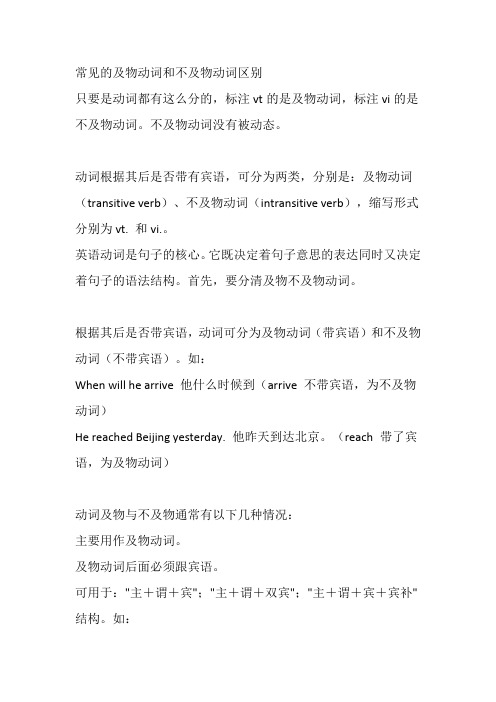
常见的及物动词和不及物动词区别只要是动词都有这么分的,标注vt的是及物动词,标注vi的是不及物动词。
不及物动词没有被动态。
动词根据其后是否带有宾语,可分为两类,分别是:及物动词(transitive verb)、不及物动词(intransitive verb),缩写形式分别为vt. 和vi.。
英语动词是句子的核心。
它既决定着句子意思的表达同时又决定着句子的语法结构。
首先,要分清及物不及物动词。
根据其后是否带宾语,动词可分为及物动词(带宾语)和不及物动词(不带宾语)。
如:When will he arrive 他什么时候到(arrive 不带宾语,为不及物动词)He reached Beijing yesterday. 他昨天到达北京。
(reach 带了宾语,为及物动词)动词及物与不及物通常有以下几种情况:主要用作及物动词。
及物动词后面必须跟宾语。
可用于:"主+谓+宾";"主+谓+双宾";"主+谓+宾+宾补"结构。
如:He reached Paris the day before yesterday.They asked me to go fishing with them.1) 及物动词+宾语例:I love my home. 我爱我家。
He bought an English dictionary. 他买了一本英语词典。
2) 及物动词+间接宾语+直接宾语例:She taught us maths. 她教我们数学。
My mother gave me a new pen. 母亲给了我一支新钢笔。
提示:常用的能接双宾语的及物动词有:give, teach, buy, lend, find, hand, leave, sell, show, read, pay, make, offer, build, pass, bring, cook, catch, invent, found, like, observe, offer, prevent, promise, raise, find, forget, receive, regard, see, say, seat, supply, select, suppose, show, make, take, tell....b主要用作不及物的动词。
及物动词与不及物动词的区别与用法
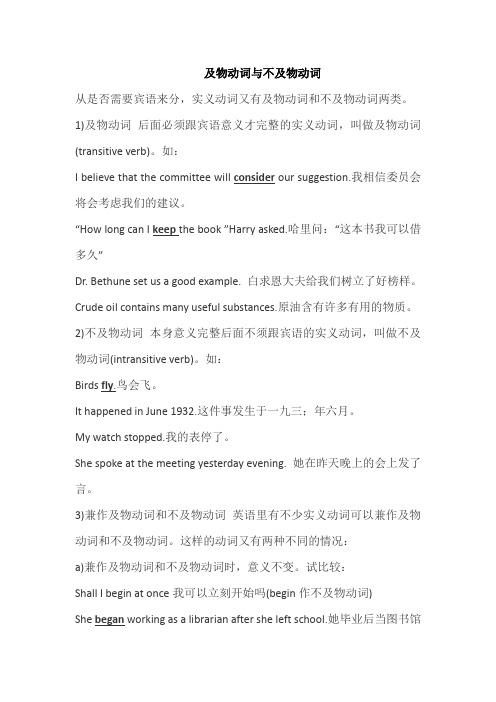
及物动词与不及物动词从是否需要宾语来分,实义动词又有及物动词和不及物动词两类。
1)及物动词后面必须跟宾语意义才完整的实义动词,叫做及物动词(transitive verb)。
如:I believe that the committee will consider our suggestion.我相信委员会将会考虑我们的建议。
“How long can I keep the book ”Harry asked.哈里问:“这本书我可以借多久”Dr. Bethune set us a good example. 白求恩大夫给我们树立了好榜样。
Crude oil contains many useful substances.原油含有许多有用的物质。
2)不及物动词本身意义完整后面不须跟宾语的实义动词,叫做不及物动词(intransitive verb)。
如:Birds fly.鸟会飞。
It happened in June 1932.这件事发生于一九三;年六月。
My watch stopped.我的表停了。
She spoke at the meeting yesterday evening. 她在昨天晚上的会上发了言。
3)兼作及物动词和不及物动词英语里有不少实义动词可以兼作及物动词和不及物动词。
这样的动词又有两种不同的情况:a)兼作及物动词和不及物动词时,意义不变。
试比较:Shall I begin at once我可以立刻开始吗(begin作不及物动词)She began working as a librarian after she left school.她毕业后当图书馆管理员。
(began作及物动词)When did they leave Chicago他们是什么时候离开芝加哥的(leave 作及物动词)They left last week. 他们是上周离开的。
(left 作不及物动词)b)兼作及物动词和不及物动词时,有时意义不尽相同。
不及物动词与及物动词的区别
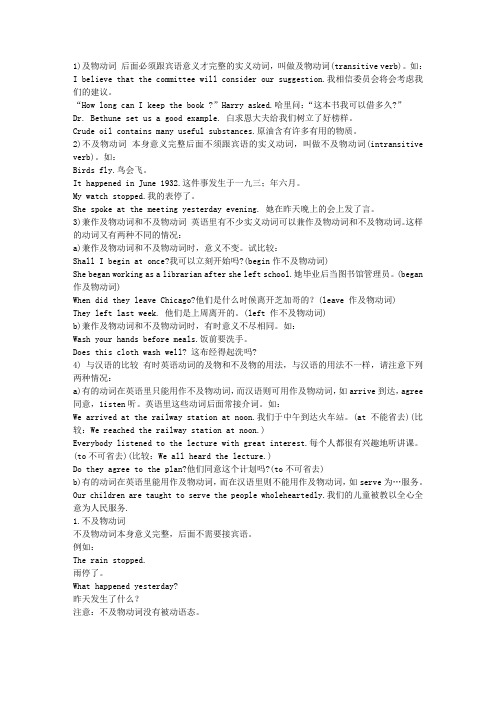
1)及物动词后面必须跟宾语意义才完整的实义动词,叫做及物动词(transitive verb)。
如:I believe that the committee will consider our suggestion.我相信委员会将会考虑我们的建议。
“How long can I keep the book ?”Harry asked.哈里问:“这本书我可以借多久?”Dr. Bethune set us a good example. 白求恩大夫给我们树立了好榜样。
Crude oil contains many useful substances.原油含有许多有用的物质。
2)不及物动词本身意义完整后面不须跟宾语的实义动词,叫做不及物动词(intransitive verb)。
如:Birds fly.鸟会飞。
It happened in June 1932.这件事发生于一九三;年六月。
My watch stopped.我的表停了。
She spoke at the meeting yesterday evening. 她在昨天晚上的会上发了言。
3)兼作及物动词和不及物动词英语里有不少实义动词可以兼作及物动词和不及物动词。
这样的动词又有两种不同的情况:a)兼作及物动词和不及物动词时,意义不变。
试比较:Shall I begin at once?我可以立刻开始吗?(begin作不及物动词)She began working as a librarian after she left school.她毕业后当图书馆管理员。
(began 作及物动词)When did they leave Chicago?他们是什么时候离开芝加哥的?(leave 作及物动词) They left last week. 他们是上周离开的。
(left 作不及物动词)b)兼作及物动词和不及物动词时,有时意义不尽相同。
如:Wash your hands before meals.饭前要洗手。
及物动词和不及物动词的区别

及物动词和不及物动词的区别动词是语言中的一类词汇,可以用来描述动作、存在状态或表达感受。
根据动词的不同特点和用法,可以将其分为及物动词和不及物动词两大类。
一、及物动词及物动词是指需要有宾语来完成意义的动词。
宾语通常是及物动词的动作的承受者、影响者或接受者。
以下是一些及物动词的示例:- eat(吃):I eat an apple.(我吃一个苹果。
)- teach(教):He teaches students.(他教学生。
)- write(写):She writes a letter.(她写信。
)在以上的例子中,及物动词后面都有一个宾语,没有宾语,这些及物动词的意义就无法完整地表达。
二、不及物动词不及物动词是指不需要宾语来完成意义的动词。
它们可以单独使用,表示动作或状态,不需要指定一个承受者或影响者。
以下是一些不及物动词的示例:- sleep(睡觉):I sleep well.(我睡得很好。
)- run(跑步):They run in the park.(他们在公园里跑步。
)- laugh(笑):She laughs at the joke.(她笑了笑。
)在以上的例子中,不及物动词的意义已经很明确,不需要宾语来补充完整。
因此,不及物动词不需要宾语,可单独使用。
三、及物动词与不及物动词的转化有一些动词既可以是及物动词,也可以是不及物动词,它们的意义根据上下文来决定。
以下是一些常见的及物动词与不及物动词的转化示例:- open(打开):I open the door.(我打开门。
)(及物动词)The door opens.(门开了。
)(不及物动词)- break(打破):He breaks the glass.(他打破了玻璃。
)(及物动词)The glass breaks.(玻璃破了。
)(不及物动词)- fall(掉落):She falls off the bike.(她从自行车上摔下来。
)(及物动词)The leaves fall from the trees.(树叶从树上掉下来。
英语及物动词与不及物动词的区别

简而言之,及物动词后面可直接接宾语,不及物动词后面不可直接接宾语,一般要加介词后再接宾语。
实际上很多动词既是及物动词,又是不及物动词。
我举一个例子,就说write。
如I am writing.和I am writing a letter.在前一个句子write是不及物动词,在后一个句子write 是及物动词。
又如,see是及物动词,但在特殊情况下如seeing is believing。
动词的情形比较复杂,除了讨论得很多的动词与介词的搭配外,动词从"受"的方面看可以为副词所修饰和限制,这些都可从搭配词典中找到. 一. 及物动词及物动词最重要的是从"授"的方向去搭配名词(这方面的材料一般搭配词典均付厥如).它"作用"于名词的道理也和形容词相似,词义是通过搭配而体现. 例: quench ~ a fire 灭火~the flames 扑灭火焰~ a lamp 熄灯~ a / the hope 断绝希望~the opposition 压制反对~one's desire 遏制欲望~one's thirst 解渴比较: quiet sb's fears 消除某人的疑虑quell fears 消除恐惧squash a revolt 平定叛乱squelch the tendencies 制止某种倾向及物动词及其所搭配的名词(作宾语)的组合,中文叫做"动宾结构".某种意义上说,这是一种语言最最重要的组合或结构.最好是能一套一套地记下来.不但可以一箭双雕地在记住动词的同时也记了名词,而且图景具体,印象深刻.更重要的是使用起来又快又好.就象用预制件建房屋和用集成电路(IC)制作音响设备一样. 信手拈来以下数例: 填表格to complete / fill out / a form 完成任务to fulfil a task 抵挡诱惑to resist a temptation 形成习惯to form a habit 冲洗胶卷to develop a film 查地图to study a map 查字典to consult a dictionary 戒烟to quit smoking 继承传统to inherit the tradition 开支票to draw a cheque ...等等. 二. 不及物动词不及物动词可以通过适当的介词去搭配名词.如果我们把不及物动词与后接介词看成一体,它就"等效"于一个及物动词.例如: to pine for home / love / kindred / praise 渴望回家/ 爱/ 亲人/ 赞美to pay for the damage 赔偿损坏to pay for a lesson 为一个教训付出代价这方面的资料,在有些编得较好的短语动词词典可以找到.但一般搭配词典不提供. 从"受"的方面看,要注意不及物动词可以"受"哪些名词(作主语)支配.不及物动词的词义也是在这种搭配中体现的.一般搭配词典对此似未予足够重视,下面我们多给出两个例子. 例一. thrive 此词与表示现场录音,实况广播中的那个live 是叠韵近义词,即除了辅音部分之外,韵部读音和拼写都相同,词义相近. men / children / plants / animals thrive 人和其它生物作主语,表示"生长得好,茁壮成长,长得繁茂". business / cause / market thrive "生意","事业","市场"...作主语,表示"繁荣,兴旺". 例二. dwindle 缩小,减少sanctuaries for wildlife ~d 野生动物禁猎区(地域,面积的缩小). food supply ~d 食品供应(数量的减少). fortune / money ~d 钱,财(数额减少). the number of people / the regiment ~d 人员(数目减少). health / hopes ~d 健康,希望(抽象的东西: 衰退,衰减). 例三. wane 亏,衰落什麽东西会wane ? the ~ing moon 下弦月(比较: the full moon 满月) the day ~s 一天将过,日之夕矣. the ~ing tide 退潮his strength / enthusiasm / influence / reputation / fame popularity/was ~ing 力气/ 热情/ 影响/ 令誉/ 名声/ 名望日渐消退。
及物动词和不及物动词区别和用法例句
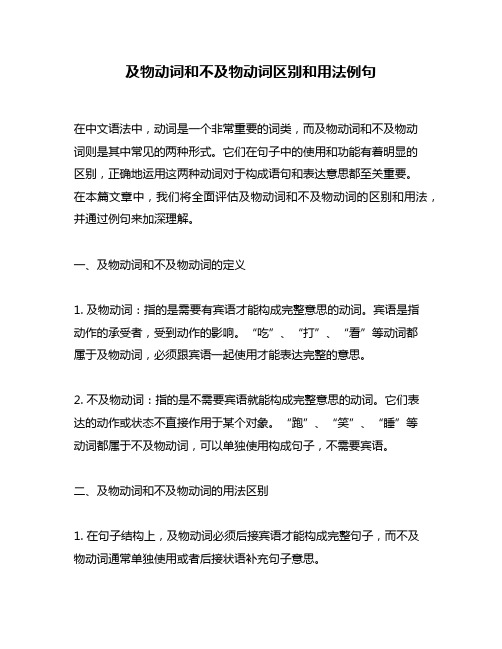
及物动词和不及物动词区别和用法例句在中文语法中,动词是一个非常重要的词类,而及物动词和不及物动词则是其中常见的两种形式。
它们在句子中的使用和功能有着明显的区别,正确地运用这两种动词对于构成语句和表达意思都至关重要。
在本篇文章中,我们将全面评估及物动词和不及物动词的区别和用法,并通过例句来加深理解。
一、及物动词和不及物动词的定义1. 及物动词:指的是需要有宾语才能构成完整意思的动词。
宾语是指动作的承受者,受到动作的影响。
“吃”、“打”、“看”等动词都属于及物动词,必须跟宾语一起使用才能表达完整的意思。
2. 不及物动词:指的是不需要宾语就能构成完整意思的动词。
它们表达的动作或状态不直接作用于某个对象。
“跑”、“笑”、“睡”等动词都属于不及物动词,可以单独使用构成句子,不需要宾语。
二、及物动词和不及物动词的用法区别1. 在句子结构上,及物动词必须后接宾语才能构成完整句子,而不及物动词通常单独使用或者后接状语补充句子意思。
2. 在句子意义上,及物动词强调动作的直接对象,而不及物动词强调动作的发出者或状态的表达。
三、及物动词和不及物动词的例句1. 及物动词的例句:(1)我吃饭。
(2)她看书。
(3)他打篮球。
2. 不及物动词的例句:(1)他跑步。
(2)孩子们笑了。
(3)她在睡觉。
总结回顾通过对及物动词和不及物动词的深入探讨,我们可以清晰地理解它们在句子中的使用和功能区别。
及物动词需要宾语来构成完整意思,而不及物动词通常可以独立使用或者后接状语补充句子。
在实际运用中,我们需要根据句子要表达的意思来正确选择及物动词或不及物动词,以保证句子表达的准确性和完整性。
个人观点在学习语言时,动词是一个关键的部分,而及物动词和不及物动词的正确运用更是需要我们反复练习和总结。
只有通过不断的实践和思考,我们才能在表达中游刃有余地使用这两种动词,使我们的语言表达更加准确和丰富。
以上就是我对及物动词和不及物动词的理解和个人观点。
希望本文对您有所帮助。
及物动词与不及物动词的区别
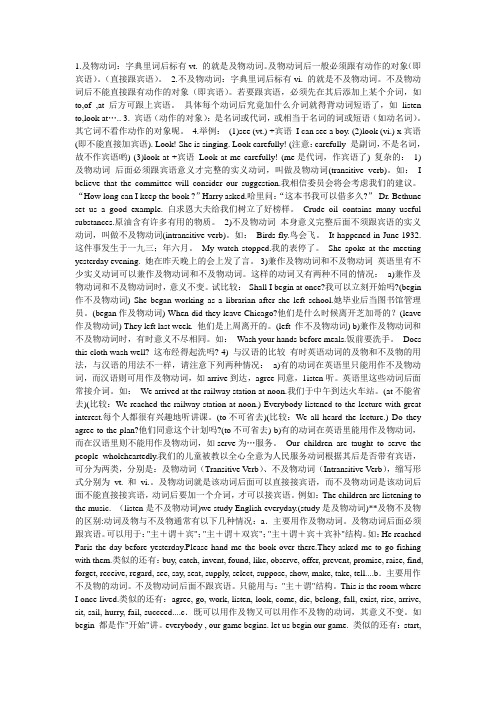
1.及物动词:字典里词后标有vt. 的就是及物动词。
及物动词后一般必须跟有动作的对象(即宾语)。
(直接跟宾语)。
2.不及物动词:字典里词后标有vi. 的就是不及物动词。
不及物动词后不能直接跟有动作的对象(即宾语)。
若要跟宾语,必须先在其后添加上某个介词,如to,of ,at后方可跟上宾语。
具体每个动词后究竟加什么介词就得背动词短语了,如listen to,look at…..3. 宾语(动作的对象):是名词或代词,或相当于名词的词或短语(如动名词)。
其它词不看作动作的对象呢。
4.举例:(1)see (vt.) +宾语I can see a boy. (2)look (vi.) x宾语(即不能直接加宾语). Look! She is singing. Look carefully! (注意:carefully 是副词,不是名词,故不作宾语哟) (3)look at +宾语Look at me carefully! (me是代词,作宾语了) 复杂的:1)及物动词后面必须跟宾语意义才完整的实义动词,叫做及物动词(transitive verb)。
如:I believe that the committee will consider our suggestion.我相信委员会将会考虑我们的建议。
“How long can I keep the book ?”Harry asked.哈里问:“这本书我可以借多久?”Dr. Bethune set us a good example. 白求恩大夫给我们树立了好榜样。
Crude oil contains many useful substances.原油含有许多有用的物质。
2)不及物动词本身意义完整后面不须跟宾语的实义动词,叫做不及物动词(intransitive verb)。
如:Birds fly.鸟会飞。
It happened in June 1932.这件事发生于一九三;年六月。
常见的及物动词和不及物动词区别
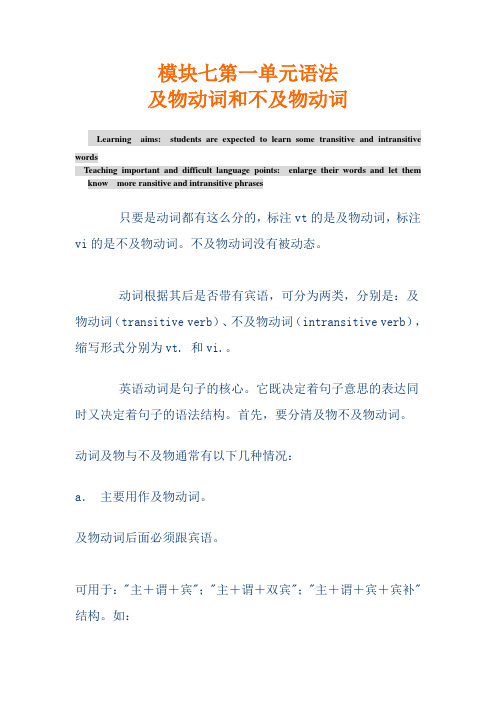
模块七第一单元语法及物动词和不及物动词Learning aims: students are expected to learn some transitive and intransitive wordsTeaching important and difficult language points: enlarge their words and let them know more ransitive and intransitive phrases只要是动词都有这么分的,标注vt的是及物动词,标注vi 的是不及物动词。
不及物动词没有被动态。
动词根据其后是否带有宾语,可分为两类,分别是:及物动词(transitive verb)、不及物动词(intransitive verb),缩写形式分别为vt. 和vi.。
英语动词是句子的核心。
它既决定着句子意思的表达同时又决定着句子的语法结构。
首先,要分清及物不及物动词。
动词及物与不及物通常有以下几种情况:a.主要用作及物动词。
及物动词后面必须跟宾语。
可用于:"主+谓+宾";"主+谓+双宾";"主+谓+宾+宾补"结构。
如:he reached paris the day before yesterday.they asked me to go fishing with them.类似的还有:buy, catch, invent, found, like, observe, offer, prevent, promise,raise, find, forget,receive, regard, see, say, seat, supply, select,suppose, show, make, take, tell....1、及物动词是必须带宾语的动词,可分为如下两类。
1) 及物动词+宾语例:I love my home. 我爱我家。
及物动词和不及物动词短语

及物动词和不及物动词短语及物动词和不及物动词短语是语法中非常重要的概念,它们在英语中有着非常广泛的应用,是英语语法的基础。
在这篇文章中,我们将详细讨论及物动词和不及物动词短语的定义、区别、用法及实例。
一、及物动词的定义及物动词是指需要一个宾语来补充完整它的意思的动词。
宾语是一个名词、代词或其他的词类,它说明动作的对象或受动作影响的人或物。
例如:I ate a sandwich.(我吃了一个三明治。
)其中,eat是及物动词,sandwich是它的宾语。
不及物动词是指不需要一个宾语来补充完整它的意思的动词。
不及物动词可以单独使用,而不需要补充其他信息。
例如:The dog barked.(狗叫了。
)其中,bark是不及物动词。
及物动词短语是一个由及物动词和其宾语一起构成的短语。
及物动词短语通常用于表示一个动作或者状态。
例如:She drinks orange juice every morning.(她每天早上喝橙汁。
)其中,drink是及物动词,orange juice是它的宾语。
1. 宾语:及物动词需要一个宾语来使它的意思完整,而不及物动词不需要。
2. 结构:及物动词可以构成及物动词短语,而不及物动词则不能。
3. 意义:及物动词主要表示动作或状态的执行及其影响,而不及物动词则主要表示状态或动作的存在。
1. 及物动词的用法及物动词通常用于表示动作或状态的执行及其影响。
例如:- She is cooking dinner.(她在煮晚餐。
)- He broke the vase.(他打破了花瓶。
)- We need to buy groceries.(我们需要买杂货。
)2. 不及物动词实例七、总结。
及物动词和不及物动词的区别(课堂PPT)

interest.
每个人都很有兴趣地听讲课。(to不可省去)
(比较:We all heard the lecture.)
Do they agree to the plan?
他们同意这个计划吗?(to不可省去)
9
b)有的动词在英语里能用作及物动词, 而在汉语里则不能用作及物动词,
如serve为…服务。 Our children are taught to serve the
竟加什么介词就得看动词本身和所要表达
的意义了 (look after, agree with, take
after)
3. 不及物动词(vi)(intransitive verb)
4. 及物动词(vt)( transitive verb)
2
及物动词(vt)
后面必须跟宾语意义才完整的实义动词,叫做 及物动词。
6
b)兼作及物动词和不及物动词时,有时 意义不尽相同。
Wash your hands before meals. 饭前要洗手。 Does this cloth wash well? 这布经得起洗吗?
7
与汉语的比较
有时英语动词的及物和不及物的用法, 与汉语的用法不一样,请注意下列两种 情况:
a)有的动词在英语里只能用作不及物动 词,而汉语则可用作及物动词,
She began working as a librarian after she
left school.
她毕业后当就开始图书馆管理员。(began作
及物动词)
5
When did they leave Chicago? 他们是什么时候离开芝加哥的?(leave
作及物动词) They left last week. 他们是上周离开的。(left 作不及物动词)
[英语及物动词和不及物动词的区别]及物动词和不及物动词的区别
![[英语及物动词和不及物动词的区别]及物动词和不及物动词的区别](https://img.taocdn.com/s3/m/5d8f3dfd05a1b0717fd5360cba1aa81144318f36.png)
[英语及物动词和不及物动词的区别]及物动词和不及物动词的区别及物动词在英语中按动词后可否直接跟宾语,可以把动词分成两种:及物动词与不及物动词。
字典里词后标有vt.的就是及物动词,标有vi. 的就是不及物动词。
不及物动词后不能直接跟有动作的对象(即宾语)。
若要跟宾语,必须先在其后添加上某个介词,如to,of ,at后方可跟上宾语。
及物动词:又称“他动词”。
又称“外动词”。
动词的一种。
它所表示的动作常涉及动作者以外的事物,如“吃”、“穿”、“读”、“写”等。
字典里词后标有vt. 的就是及物动词。
及物动词后必须跟有动作的对象(即宾语),并且可直接跟宾语。
及物动词transitive verbs(vt.)在英语中按动词后可否直接跟宾语,可以把动词分成两种:及物动词与不及物动词。
字典里词后标有vt.的就是及物动词,标有vi. 的就是不及物动词。
不及物动词后不能直接跟有动作的对象(即宾语)。
若要跟宾语,必须先在其后添加上某个介词,如to,of ,at后方可跟上宾语。
及物动词:又称“他动词”。
又称“外动词”。
动词的一种。
它所表示的动作常涉及动作者以外的事物,如“吃”、“穿”、“读”、“写”等。
字典里词后标有vt. 的就是及物动词。
及物动词后必须跟有动作的对象(即宾语),并且可直接跟宾语。
可以用于:"主+谓+宾";"主+谓+双宾";"主+谓+宾+宾补"结构。
例:He reached Paris the day before yesterday.Please hand me the book over there.They asked me to go fishing with them.不及物动词在英语中按动词后可否直接跟宾语,可以把动词分成两种:及物动词与不及物动词。
字典里词后标有vt. 的就是及物动词,字典里词后标有vi. 的就是不及物动词。
及物动词后能直接跟有动作的对象(即宾语)。
及物动词和不及物动词的区别 用法有什么不同
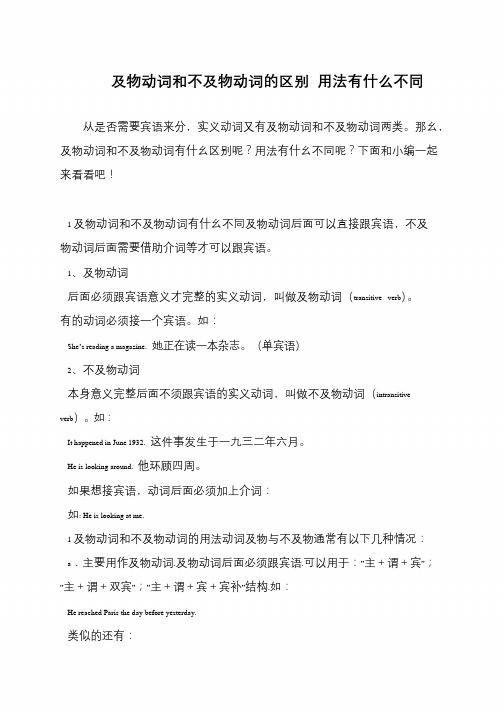
及物动词和不及物动词的区别用法有什么不同
从是否需要宾语来分,实义动词又有及物动词和不及物动词两类。
那幺,及物动词和不及物动词有什幺区别呢?用法有什幺不同呢?下面和小编一起来看看吧!
1 及物动词和不及物动词有什幺不同及物动词后面可以直接跟宾语,不及
物动词后面需要借助介词等才可以跟宾语。
1、及物动词
后面必须跟宾语意义才完整的实义动词,叫做及物动词(transitive verb)。
有的动词必须接一个宾语。
如:
She’s reading a magazine. 她正在读一本杂志。
(单宾语)
2、不及物动词
本身意义完整后面不须跟宾语的实义动词,叫做不及物动词(intransitive verb)。
如:
It happened in June 1932. 这件事发生于一九三二年六月。
He is looking around. 他环顾四周。
如果想接宾语,动词后面必须加上介词:
如: He is looking at me.
1 及物动词和不及物动词的用法动词及物与不及物通常有以下几种情况:a.主要用作及物动词.及物动词后面必须跟宾语.可以用于:”主+谓+宾”;”主+谓+双宾”;”主+谓+宾+宾补”结构.如:
He reached Paris the day before yesterday.
类似的还有:。
- 1、下载文档前请自行甄别文档内容的完整性,平台不提供额外的编辑、内容补充、找答案等附加服务。
- 2、"仅部分预览"的文档,不可在线预览部分如存在完整性等问题,可反馈申请退款(可完整预览的文档不适用该条件!)。
- 3、如文档侵犯您的权益,请联系客服反馈,我们会尽快为您处理(人工客服工作时间:9:00-18:30)。
常见的及物动词和不及物动词区别只要是动词都有这么分的,标注vt的是及物动词,标注vi的是不及物动词。
不及物动词没有被动态。
动词根据其后是否带有宾语,可分为两类,分别是:及物动词(transitive verb)、不及物动词(intransitive verb),缩写形式分别为vt. 和vi.。
英语动词是句子的核心。
它既决定着句子意思的表达同时又决定着句子的语法结构。
首先,要分清及物不及物动词。
根据其后是否带宾语,动词可分为及物动词(带宾语)和不及物动词(不带宾语)。
如:When will he arrive? 他什么时候到?(arrive 不带宾语,为不及物动词)He reached Beijing yesterday. 他昨天到达北京。
(reach 带了宾语,为及物动词)动词及物与不及物通常有以下几种情况:a.主要用作及物动词。
及物动词后面必须跟宾语。
可用于:"主+谓+宾";"主+谓+双宾";"主+谓+宾+宾补"结构。
如:He reached Paris the day before yesterday.They asked me to go fishing with them.1) 及物动词+宾语例:I love my home. 我爱我家。
He bought an English dictionary. 他买了一本英语词典。
2) 及物动词+间接宾语+直接宾语例:She taught us maths. 她教我们数学。
My mother gave me a new pen. 母亲给了我一支新钢笔。
提示:常用的能接双宾语的及物动词有:give, teach, buy, lend, find, hand, leave, sell, show, read, pay, make, offer, build, pass, bring, cook, catch, invent, found, like, observe, offer, prevent, promise, raise, find, forget, receive, regard, see, say, seat, supply, select, suppose, show, make, take, tell....b主要用作不及物的动词。
不及物动词后面不跟宾语。
只能用与:"主+谓"结构。
不及物动词不需要跟宾语,本身意义完整。
例:She came last week. 她上周来的。
It is raining hard. 正下着大雨。
Class began at half past seven. 7点半开始上课。
What happened yesterday? 昨天发生了什么事?This is the room where i once lived.类似的还有:agree, go, work, listen, look, come, die, belong, fall, exist, rise, arrive, sit, sail, hurry, fail, succeed appear get feel, keep make prove remain restrise seem stand stay turn turn out, wait, cry, smile, laugh, stop, rain, snowc.既可以用作及物又可以用作不及物的动词,其意义不变。
如begin 都是作"开始"讲。
Everybody, our game begins. let us begin our game.She can dance and sing.她能唱歌又能跳舞。
(sing在此用作不及物动词。
)She can sing many English songs.她能唱好多首英文歌曲。
(sing用作及物动词。
)The child is playing. 这小孩在玩。
(不及物用法)The child is playing the piano. 这小孩在弹钢琴。
(及物用法)He is writing. 他在写字。
(不及物用法)He is writing a letter. 他在写信。
(及物用法)The boy is reading. 这男孩在阅读。
(不及物用法)The boy is reading a magazine. 这男孩在看杂志。
(及物用法)类似的有:start, answer, sing, close, consider, insist, read, learn, prepare, pay, hurt, improve....d.既可以用作及物又可以用作不及物的动词,其意义完全不同。
这类动词作不及物动词是一个意义;而作及物动词时却是另一个意义。
如lift作不及物动词时是指烟雾的"消散"。
We saw the mountain when the clouds lifted.lift作及物动词时是"升高;举起"。
He lifted his glass and drank.类似的还有:beat vi.跳动vt. 敲、打;grow vi.生长vt. 种植play vi.玩耍vt. 打(牌、球),演奏smell vi.发出(气味)vt. 嗅ring vi.(电话、铃)响vt.打电话speak vi.讲话vt. 说(语言)hang vi. 悬挂vt. 绞死operate vi.动手术vt. 操作20个常见的不及物动词短语1.break down (stop functioning 坏了,不好使了)That old jeep had a tendency to break down just when i needed it the most.2.catch on (become popular 出名)Popular songs seem to catch on in California first and then spread eastward.3. come back ( return to a place 返回)Father promised that we would never come back to this horrible place.4. come in ( enter进入)They tried to come in through the back door, but it was locked. e to ( regain consciousness恢复意识)He was hit on the head very hard, but after several minutes, he started to come to again.e over (to visit访问)The children promised to come over, but they never do.7.drop by (visit without appointment 顺便拜访) we used to just drop by, but they were never home, so we stopped doing that.8.eat out (dine in a restaurant 外出吃饭)When we visited Paris, we loved eating out in the sidewalk cafes.9. get by ( survive凑合,过得去)Uncle Heine didn't have much money, but he always seemed to get by without borrowing money from relatives.10.get up ( arise起床)Grandmother tried to get up, but the couch was too low, and she couldn't make it on her own.11. go back ( return to a place 回到)It's hard to imagine that we will never go back to our homeland.12.go on ( continue继续)He would finish one dickens novel and then just go on to the next. 13. go on (2) ( happen发生)The cops heard all the noise and stopped to see what was going on. 14. grow up ( get older变老)Charles grew up to be a lot like his father.15.keep away ( remain at a distance保持距离)The judge warned the stalker to keep away from his victim's home. 16. keep on (+动名称) ( continue with the same继续保持)He tried to keep on singing long after his voice was ruined.17. pass out ( lose consciousness, faint昏过去,晕)He had drunk too much; he passed out on the sidewalk outside the bar.18. show off ( demonstrate haughtily 炫耀)Whenever he sat down at the piano, we knew he was going to show off.19. show up( arrive到达,出现)It was ten o'clock when he finally showed up.20. wake up (arouse from sleep醒来)I woke up when the rooster crowed.21.take place 发生In 1919,the may 4th movement took place in china.e out出版,出来,Is the new edition of the book coming out?e true 实现Your wish will one day come true . 您的愿望总有一天会实现的。
